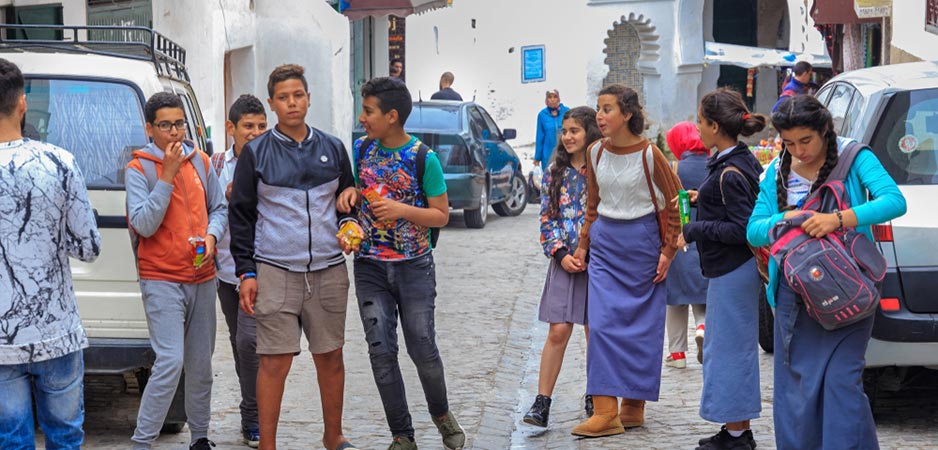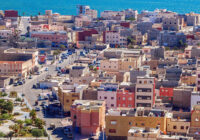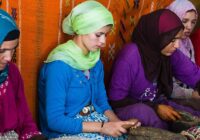According to the latest findings of the Arab Barometer, which surveyed approximately 2,400 Moroccans in face-to-face interviews in the fall of 2018, attitudes are largely split along generational lines. While the older generation (50+) still has confidence in the country’s institutions, younger Moroccans, reflecting trends across the Arab world, are frustrated with the lack of economic and political opportunities.
Overall, all groups see the economy and the quality of public services as the most important challenges facing the government. They also “say corruption is found in state institutions,” although to a lesser degree than the last survey in 2016 (38% vs. 39%).
The weak performance of the government has resulted in a correspondingly low level of trust among the citizens, especially the youth. Yet the majority still support the army, police and judiciary, according to the survey results. Among those under 30 years of age, 70% believe they have to emigrate to have a good life, which only falls to 50% among all those surveyed. Unfortunately, it is the young people with higher levels of education who feel most strongly that they have to leave to succeed.
This concern with emigration was the subject of a very critical opinion piece on Morocco World News by writer Hassan Masiky, who pointed out the great loss to Morocco because educated young people are leaving and finding success abroad rather than at home. He says this is both a validation of “the competence, aptitude, and talent of Moroccans and evidence of the failure of the Moroccan government to create an environment for attracting and keeping a talented workforce.” He blames this on three conditions.
The first is that “unqualified people hold many high-level positions in the public and semi-public sectors in the Kingdom.” He adds: “Nepotism and favoritism continue to dominate the hiring practices in the government and in some private sectors. This fact nullifies the government’s heavy investments in human capital.” Second, he takes aim at “a deteriorating public education system, nepotism, incompetence, and lack of transparency,” which is depriving Morocco of some of its brightest youth. Third, he points to the lack of enforcement in contracts for programs targeting employment opportunities as the third force destabilizing the economy and not firming up the local job market.
Perceptions of corruption were part of the focus of surveys done by the Global Corruption Barometer — Africa 2019. It compared attitudes of Moroccans from 2015 and 2019 and found that 53% think that corruption has increased in the past year — twice the number of 26% in 2015 — while 31% responded that they had paid a bribe in the previous 12 months to access a public service (down from 48% in 2015). Added to this, 74% think the government is doing a poor job of tackling corruption (up from 64% in 2015) and, importantly, 49% believe that ordinary citizens can make a difference in the fight against corruption. When asked which institutions were corrupt, the biggest increase was in the office of the prime minister from 20% in 2015 to 39% in 2019, followed by members of parliament, which rose from 36% to 41%.
Economic Development and Loans From the World Bank
Funding for economic development always has preconditions, and one of the biggest challenges facing developing countries, particularly non-oil producers, is borrowing to build needed infrastructure for transportation and power production, education and health facilities, and environmental projects.
One only needs to look at the high-speed train from Tangier to Casablanca, the trams in Rabat and Casablanca, large-scale renewable energy projects and funding for the growth in ports over the past two decades to identify where external funding is required for their realization. While some initiatives like toll roads and ports have built revenue streams, other projects are built on the assumption that their revenue, in time, will offset the interest and principle payments when they come due. While this is true for public-private partnerships in renewable energy whether solar, wind or hydro, it does not apply to programs that have no direct revenue streams, such as building human resources.
This is a conundrum faced by Morocco, which must reach out to international agencies and donors to support its efforts to develop its human resources. Building the skills and capabilities of Morocco’s citizens is a consistent policy focus of King Mohammed VI, underlying his plans to build cities focusing on regional advantages and promoting technical and vocational skills needed in the country.
It is in this context that the World Bank announced its approval of a new $300-million loan to support the strengthening of “Morocco’s municipalities” as part of the country’s reforms to upgrade public administrations. This is tied to both Morocco’s regionalization and decentralized economic development goals.
The statement from the World Bank said that the loan seeks to help Morocco in its “broader efforts to upgrade urban services and turn urban conglomerations into engines of growth and job creation.” It is critical that local governments receive training in all the skills needed for providing services institutionally and effectively. According to Jesko Henschel, the World Bank’s Maghreb country director, the “program will target key gaps in performance to promote a transparent, efficient, and accountable urban management system that can drive long-term local development and enhance Moroccan cities’ attractiveness.”
This program and the recent $500-million loan from the World Bank to improve the education sector exemplify the mounting external debt that results from borrowing for development. While Morocco’s external debt is still relatively manageable, Abdellatif Jouahri, the governor of the central bank, said he expected external debt to rise to 16.6% of Morocco’s GDP in 2019, up from 13.8% of GDP in 2018. In his annual report, he noted that Morocco is in a financial crisis as the economy is not able to keep up with growing special demands financed by external sources. CEIC found that the external debt in Morocco reached $53.2 billion in June 2019, compared to $51.4 billion in the previous quarter.
*[This article was originally published by Morocco on the Move.]
The views expressed in this article are the author’s own and do not necessarily reflect Fair Observer’s editorial policy.
Support Fair Observer
We rely on your support for our independence, diversity and quality.
For more than 10 years, Fair Observer has been free, fair and independent. No billionaire owns us, no advertisers control us. We are a reader-supported nonprofit. Unlike many other publications, we keep our content free for readers regardless of where they live or whether they can afford to pay. We have no paywalls and no ads.
In the post-truth era of fake news, echo chambers and filter bubbles, we publish a plurality of perspectives from around the world. Anyone can publish with us, but everyone goes through a rigorous editorial process. So, you get fact-checked, well-reasoned content instead of noise.
We publish 2,500+ voices from 90+ countries. We also conduct education and training programs
on subjects ranging from digital media and journalism to writing and critical thinking. This
doesn’t come cheap. Servers, editors, trainers and web developers cost
money.
Please consider supporting us on a regular basis as a recurring donor or a
sustaining member.
Will you support FO’s journalism?
We rely on your support for our independence, diversity and quality.






